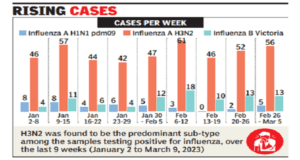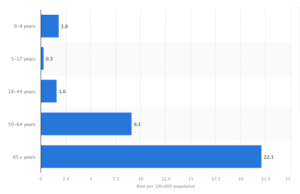
Influenza Panel and H3N2
What is H3N2?
H3N2 is a subtype of Influenza A virus which majorly affects humans. A sharp rise in H3N2 influenza cases has been reported in India.
Signs and Symptoms ?
Fever, Headache, Dry, persistent cough, Shortness of breath, Aching muscles, Chills and sweats, Tiredness and weakness, Runny or stuffy nose, Sore throat, Eye pain, Vomiting and diarrhoea, but this is more common in children than adults.
DIAGNOSIS?
RT-PCR Methods is recommended for the detection of zoonotic influenza in humans.
Influenza Panel includes (Inf A, Inf B, H1N1(Swine Flu), H3N2, RSV
Specimen: Nasopharyngeal swab and oropharyngeal swab
DOES TREATMENT DIFFER?
Oseltamivir, a drug used to treat H1N1, has been recommended by the World Health Organization for the treatment of H3N2.
Rise in Cases of Influenza
WHAT ARE THE COMPLICATIONS?
Severity of human illness associated with H3N2v resembles that of seasonal flu.
Sometimes seasonal influenza can lead to complications like pneumonia, cardiovascular.
It also can lead to hospitalization and even death.
- Humans can be infected with avian, swine and other zoonotic influenza viruses, such as avian influenza virus subtypes A(H5N1), A(H7N9), and A(H9N2) and swine influenza virus subtypes A(H1N1), A(H1N2) and A(H3N2).
How it spreads
In terms of transmission, human infections with avian and other zoonotic influenza viruses, though rare, have been reported sporadically.
Human infections are primarily acquired through direct contact with infected animals or contaminated environments, but do not result in efficient transmission of these viruses between people.
Who is at risk?
Children younger than 5 years, people 65 years and older, pregnant women, and people with certain long-term health conditions (like asthma, diabetes, heart disease, weakened immune systems, and neurological or neurodevelopmental conditions).
Mortality Rate
Prevention
- Regular hand washing with proper drying of the hands.
- Good respiratory hygiene – covering mouth and nose when coughing or sneezing, using tissues and disposing of them correctly.
- Early self-isolation of those feeling unwell, feverish and having other symptoms of influenza.
- Avoiding close contact with sick people
- Avoiding touching one’s eyes, nose or mouth.


